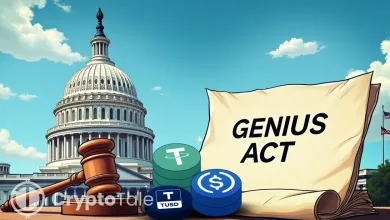SEC Reviews Crypto ETF Proposals, Eyes Staking in ETH ETFs

- SEC reviews XRP ETF filing from Canary Capital, joining proposals from other major firms.
- 21Shares and Grayscale seek SEC approval to add staking features to Ethereum ETFs.
- Trump admin’s SEC shows openness to crypto innovation with new task force & classifications.
The Securities and Exchange Commission has begun reviewing multiple new cryptocurrency ETF proposals. The agency acknowledged a spot XRP ETF filing from Cboe BZX Exchange on behalf of Canary Capital while also considering proposals to allow staking capabilities in existing Ethereum ETFs.
The XRP ETF filing has entered a crucial phase as the SEC opens its 21-day public comment period following the Federal Register publication. This acknowledgment marks the second phase in the two-part crypto ETF approval process, joining similar filings from firms such as 21Shares, Bitwise, Grayscale, and CoinShares.
Canary Capital’s involvement is notable, as the firm already has a Litecoin ETF filing under SEC review. In a parallel development, the SEC is reviewing proposals to enhance existing Ethereum ETF offerings through staking capabilities. Cboe BZX Exchange, representing 21Shares, submitted a 19b-4 filing seeking permission for their Core Ethereum ETF to stake its ETH holdings. This modification would allow the fund to generate additional returns for investors.
The filing emphasizes that staking would exclusively involve ETH owned by the trust, avoiding delegated staking or staking-as-a-service arrangements. This approach aims to maintain direct control over assets while participating in network validation.
NYSE Arca has filed a similar proposal for Grayscale’s Ethereum ETFs, indicating broader industry interest in incorporating staking features. These developments highlight the evolution of crypto ETFs from passive holding vehicles to more sophisticated investment instruments.
This shift in ETF functionality aligns with the evolving stance of the SEC, which previously viewed proof-of-stake tokens as securities, leading firms to exclude staking features from initial ETF applications.
Related: SEC Drops Broker-Dealer Rule Challenge: What’s Next for DeFi?
The creation of a dedicated crypto task force and plans to classify certain tokens as non-securities is a major step in changing the regulatory environment. This transition could allow the approval of more complex crypto investment products while maintaining appropriate oversight.
The growing number of spot ETF applications and proposals to enhance existing products through staking reflects the maturation of the cryptocurrency investment sector. These developments could provide investors with more diverse options for participating in cryptocurrency markets through regulated vehicles.




